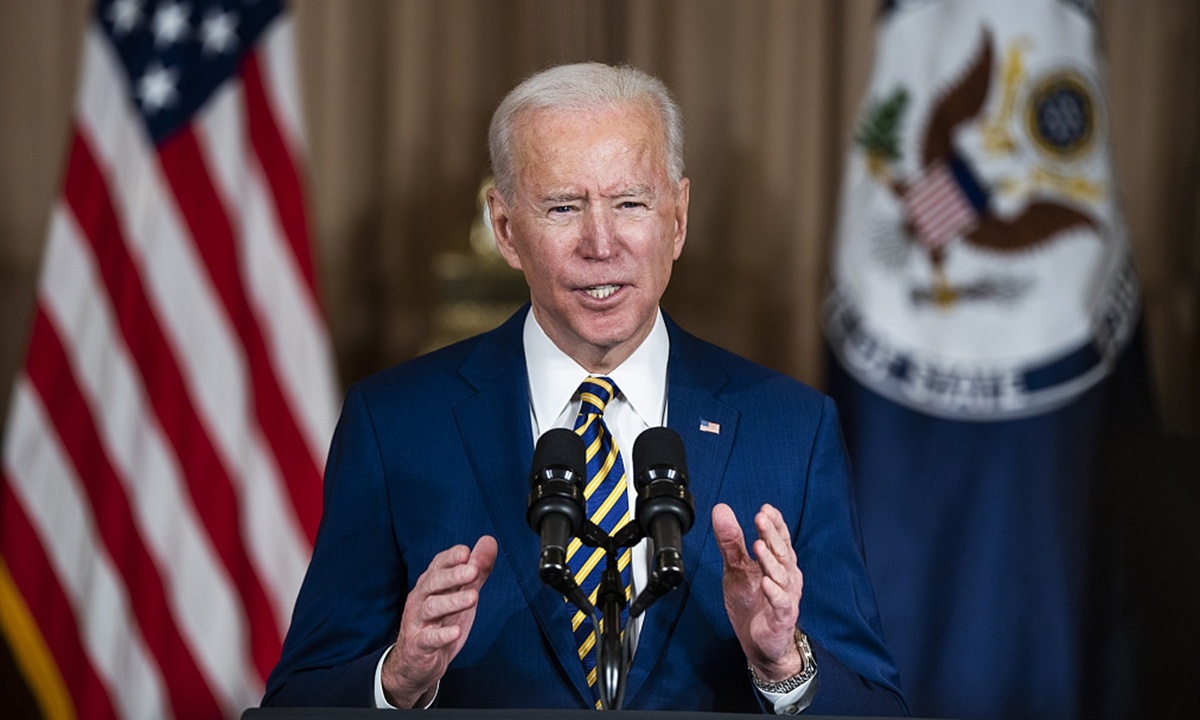
Biden Photo: CFP
US President Joe Biden said his administration was ready for an "extreme competition" with China in a CBS interview clip published on Sunday. "I'm not going to do it the way Trump did. We are going to focus on the international rules of the road," Biden said.
Biden's remarks actually are in line with a lot of Chinese experts' prediction. In his first foreign policy address on Thursday, Biden described China as the "most serious competitor" to the US and vowed to confront China on various fronts including human rights, intellectual property and economic policy.
China-US competition is an actual topic. The US regards China as a competitor, and China also treats de facto the US as a competitor subconsciously. But what China wants to compete with the US for is not the No.1 position of the world, or the hegemony. China wants the right to its own development and national rejuvenation.
Biden's remarks that China will face "extreme competition" from the US reveal US' crisis awareness. China has been developing so fast and so well, which has heightened US' sense of crisis, especially since the outbreak of the COVID-19 pandemic. China's anti-epidemic achievements have caught the attention of the whole world. And now many Westerners are worried that there could even be a development or governance model competition.
Whether we admit it or not, China and the US will have an "extreme competition" - The question is whether this competition is healthy or not. Biden's remarks indicate that this competition is not going to develop to the point of conflict. In general, this is a positive signal. As the US president, Biden believes that there is no need for conflict between the US and China because conflict is not in US interest. Both sides can actually manage the competition.
On whether he plans to speak with Chinese President Xi Jinping, Biden said, "We haven't had occasion to talk to him yet. There's no reason not to call him." The Biden administration is now dealing with China with strategic patience. For one thing, Biden has to prioritize domestic affairs. For another, he prefers considering how to speak with the Chinese side after coordinating a united approach with his allies and partners on China. Besides, the Biden administration needs the patience to resolve the differences and contradictions between the two nations.
Former president Donald Trump plunged the China-US relationship into the lowest ebb it had seen since 1979. Although he has left office, Trump's legacy is still haunting the US. Being tough on China has been somewhat a political consensus within the US.
As a result, even though Republicans have been accusing Biden of being soft on China, Democrats don't have an essentially different stance of being tough on China either.
Taking all these factors into consideration, Biden is not in a hurry to have a phone call with President Xi. If the call is not carried out in a good atmosphere, it will be meaningless. But as long as the right timing shows up, or the US is in need of a call, Biden will probably pick up the phone.
To foster the right timing, the US clearly needs a sense of mutual respect while showing good will and good faith. Washington has a lot to do to help China-US relations out of the current tensions.
Unfortunately, it is a pity that the tough position against China has gained the upper hand in the US now. US scholars have predicted that Biden will not make any major improvements in China-US relations during the first half year of his tenure. China should be prepared for this.
During this period, China should do its own things well. China should continue reform and opening-up and handle domestic issues properly. Since China launched the 14th Five-Year Plan (2021-25) and with this year marking the 100th anniversary of the founding of the Communist Party of China, China needs to be more open and inclusive, and further advance the Belt and Road Initiative with key countries.
China should take the initiative in shaping China-US relations. If bilateral relations fail to make further progress, perhaps China can find a breakthrough on the multilateral front. Since the national strength gap between China and the US has narrowed today, China's ability in shaping China-US relations is stronger than before and China has more methods to handle pressure from the US.
The author is a deputy director and senior fellow of the Institute of American Studies, Chinese Academy of Social Sciences.


